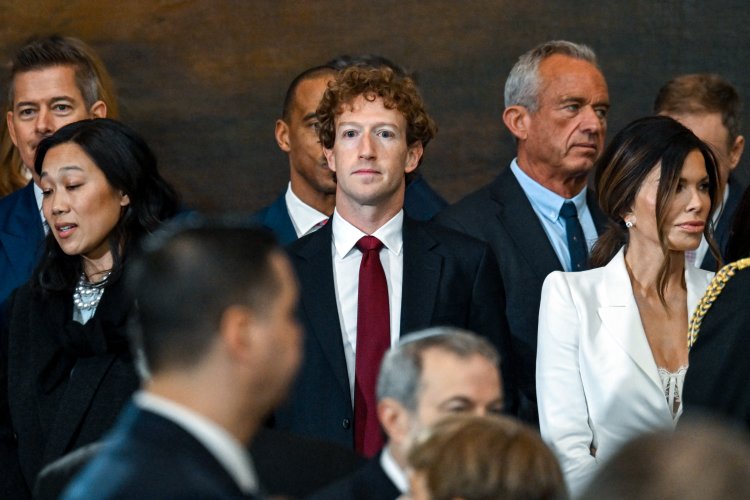Zuckerberg Recruits GOP to Target Tech Competitors Apple and Google
The Facebook founder is advocating to Congress for his company to be left unregulated — and is achieving progress in his efforts.

The Meta CEO, who owns both social media platforms, is inundating Washington with advertisements aimed at persuading lawmakers to require age verification for app store purchases and parental consent for children wishing to download social media apps.
Last year, Zuckerberg successfully influenced House Speaker Mike Johnson to halt a bill that would have mandated changes to Facebook and Instagram’s design to better protect children from bullying, sexual exploitation, and other online dangers. Should he now convince Republicans to shift focus to Apple and Google, it would demonstrate his increasing influence with the GOP majority in Congress.
There are already signs that Zuckerberg is making an impact on key decision-makers.
“They are doing a very good job distracting from any legislation that would hold them accountable,” said Ava Smithing, director of advocacy and operations at the Young People’s Alliance, an advocacy organization that supports social media regulation.
An app store age-verification bill has emerged as one of the most prominent pieces of legislation being examined by a powerful House committee in an effort to enhance online safety for children.
"Parents want a one-stop shop to verify their child’s age and approve the apps they download. The best place to do this is on the app store, and our ads reinforce the need for legislation that puts parents in charge,” Meta stated.
In July, the Senate overwhelmingly passed the Kids Online Safety Act, which would require Meta to implement design changes, and while it might have passed the House, Johnson opted not to bring it to a vote. Both Meta and Johnson argued that KOSA would infringe on the First Amendment and result in online censorship.
The Senate bill’s progress followed years of congressional hearings about social media’s dangers to children. Whistleblowers have testified to the inherent risks posed by the platforms and the awareness of company executives regarding these dangers.
Parents, schools, and numerous state attorneys general have taken legal action against social media companies for the mental and physical harms children have suffered due to bullying, illegal drug sales, and harmful content recommendations that exacerbate social comparison and eating disorders.
Despite this, it seems Congress may align with Meta’s objectives. After Johnson decided to shelve KOSA, House Energy and Commerce Chair Brett Guthrie committed to pursuing legislation for online child protection and is contemplating an age-verification proposal from Rep. John James.
“They are very interested in trying to find a way to make something like it work,” a lobbyist, who requested anonymity to discuss committee deliberations, told PMG.
In response to Meta's campaign, Google is promoting a more focused strategy, proposing to only share an age signal indicating whether a user is an adult or child with apps that pose risks to minors, as stated in a recent blog.
Apple, in a policy white paper, asserts that the responsibility for verifying user age lies with the apps.
“We ask merchants who sell alcohol in a mall to verify a buyer’s age by checking IDs — we don’t ask everyone to turn their date of birth over to the mall if they just want to go to the food court,” the report notes.
Regardless, both companies are developing age-verification tools.
Interestingly, Zuckerberg might find a powerful ally in concerned parents, who have traditionally been his primary adversaries. Over the past year, parents have organized grassroots movements and relentlessly pushed lawmakers to pass the Kids Online Safety Act and similar regulations at the state level.
By advocating for age verification, Zuckerberg is leveraging one of the parents' initiatives, effectively turning adversaries into collaborators.
Last month, a campaign led by parents led Utah to become the first state to require app store age verification.
Zuckerberg’s reframing of the debate surrounding child safety online fits into a broader strategy aimed at improving his reputation and winning over Republicans in Congress, including former President Donald Trump — a figure with whom he has had conflicts — in order to protect his company from governmental interventions.
In addition to countering the Kids Online Safety Act, Zuckerberg is also engaged in an antitrust case with the Federal Trade Commission, with potentially life-altering consequences for his business, as losing could necessitate selling Instagram.
Just a year ago, Zuckerberg was under fire regarding social media’s impacts on children. He faced adversarial questioning from Republicans on Capitol Hill concerning the phenomenon of youth suicides associated with bullying and exploitation on his platforms. Following that summer, GOP senators moved forward by passing the Kids Online Safety Act.
However, after an intense lobbying effort from the tech industry arguing that the bill infringed upon free speech rights, Johnson allowed it to stagnate.
Leading up to Johnson's decision, Zuckerberg communicated with a prominent ally of Trump in the House, expressing regret for censoring posts that criticized the government's COVID-19 response. He also utilized the company’s financial resources, contributing a greater proportion of Meta’s PAC funds to Republican candidates than previously and deploying a lobbying budget larger than that of any other corporation in the U.S., amounting to $24 million last year.
Recently, Meta settled a lawsuit with Trump regarding the company’s decision to ban him from its platforms after the January 6, 2021, Capitol insurrection, directing $25 million to Trump’s presidential library while also giving $1 million to his inaugural fund. Zuckerberg appeared on stage with Trump during his inauguration and has purchased a mansion in Washington to remain close to political power.
Parents continue to urge Congress to enact the Kids Online Safety Act, seeking its protective measures regardless of the progress on app store age verification. They recognize that age verification alone will not prevent children from accessing social media as they can still do so through web browsers or other means to circumvent the law. Moreover, parents can still allow their children to download the apps. Yet, Johnson has maintained his stance.
One reason for this inaction may be concerns that the courts will deem the Kids Online Safety Act unconstitutional. Just last month, a federal district court in San Francisco issued an injunction against a similar California law, determining that it likely infringed upon the First Amendment.
While KOSA has not yet been reintroduced this year, the Senate passed the TAKE IT DOWN Act by unanimous consent in February, which mandates platforms to secure consent from all individuals depicted in intimate images, including those generated by artificial intelligence, prior to publication. Majority Leader Steve Scalise has promised that it will be brought to the House floor for a vote soon.
The Senate Commerce Committee has also advanced the Kids Off Social Media Act, co-sponsored by its chair, Texas Republican Ted Cruz, and Hawaii Democrat Brian Schatz. This bill would formalize policies most social media companies have in place barring users under 13 from creating accounts.
In the House, discussions among the staff at Guthrie's Energy and Commerce Committee center around various bills: James' App Store Accountability Act, KOSA, the Children and Teens’ Online Privacy Protection Act, and Sammy’s Law, which would ease parental management of their children's accounts on social platforms. The committee also progressed a companion to the Senate’s TAKE IT DOWN Act back in April.
Senators are also considering app store age verification measures. Mike Lee introduced a bill last year enabling parents to sue app stores that do not verify a child's age before permitting purchases. This legislation draws from the earlier Utah state law.
Despite the potential for loopholes due to web browser access, advocates argue that age verification remains a valuable initiative.
While Meta has embraced age verification, it was a parent from Utah who demonstrated its feasibility.
Melissa McKay, a mother and dedicated child safety advocate, collaborated with attorney Joel Thayer to create a bill based on contract law.
Contracts signed by minors are typically unenforceable. However, app stores, including those of Apple and Google, require users—children included—to accept user agreements that permit data collection and limit company liability.
Thayer argued that this practice should be illegal.
“We wouldn't accept this from a bank. We wouldn't accept this from a car dealership. Why in the hell are we accepting this on an iPhone?” Thayer remarked to PMG.
McKay presented this idea to Republican Utah state Sen. Todd Weiler, who introduced an age-verification bill last year. In March, GOP Governor Spencer Cox signed it into law.
This pioneering legislation mandates that app stores ascertain the age of users and obtain verifiable parental consent for every app download and purchase for those under 18. Additionally, it requires app stores to inform parents of significant changes to apps their children have downloaded, granting parents the right to sue if an app store violates this law.
Currently, 14 additional states—Alabama, Alaska, California, Florida, Hawaii, Illinois, Kentucky, New Mexico, North Dakota, Oregon, South Carolina, South Dakota, Texas, and West Virginia—are contemplating similar measures.
Texas, a solidly Republican state, may soon join these ranks.
While both parents and Meta are aligned in their desire for increased parental controls in app stores, their motivations still diverge, according to McKay. She points out that Meta favors setting the age of consent at 16 instead of 18, a stance that would facilitate greater access for teenagers to its platforms.
“That's kind of the dead giveaway of that influence,” she remarked.
Debra A Smith for TROIB News












